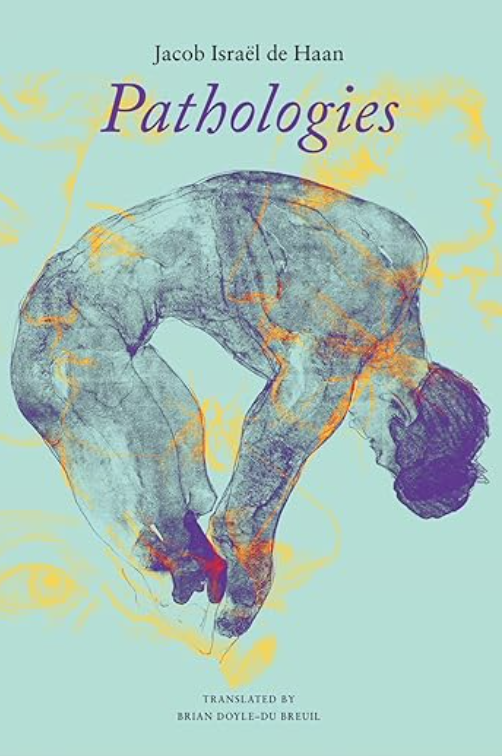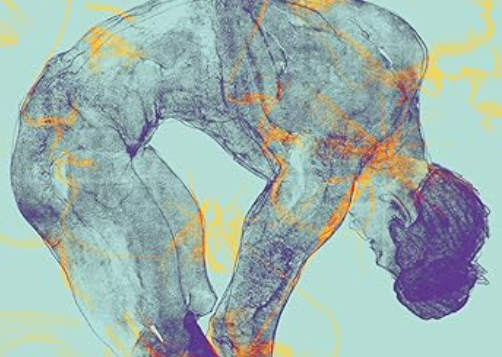 PATHOLOGIES
PATHOLOGIES
The Downfall of Johan van Vere de With
by Jacob Israël de Haan
Translated by Brian Doyle–Du Breuil
Seagull Books. 352 pages, $24.
MUCH LIKE the embattled author himself, Johan, the young protagonist of Jacob Israël de Haan’s 1908 novel Pathologies, suffers one devastating setback after another. Johan is a closeted teenager in turn-of-the-century Holland whose mother hanged herself with her own “fierce and alive” plaited hair. Further, Johan is afflicted with a consuming sexual attraction to his father. His desire troubles him to the point of illness. When he finally reveals to his father his yearning for him, his father gives him three choices: either Johan leaves, his father leaves, or they live together with “no personal contact.”
De Haan was no stranger to similar agonies in his own tormented life. His first novella, Pipelines, published in 1904, centered on an erotic relationship between two young men. The publication of the book led to his termination from a prestigious teaching job, and the first print run was prematurely ended. He also had few defenders. Frederik van Eeden, a Dutch psychiatrist, writer, and founder of a self-sustaining, resource-sharing community called Walden, rejected all of de Haan’s requests for him to champion the novel. Only the Belgian writer Georges Eekhoud came to his defense. Eekhoud’s own infamous 1899 novel Escal-vigor was about a count who becomes infatuated with an impressionable youth, the burgomaster’s son. Another writer of the era who trod similarly dangerous territory was Mikhail Kuzman, in Russia. His 1906 novel Wings is about a young man who becomes infatuated with his urbane mentor. Many decades later, American author Edmund White would publish a novel about a boy who develops sexual feelings for his father in A Boy’s Own Story (1982).
It should come as no surprise that homosexuals remained in the closet and were duly aggrieved in de Haan’s day. A relatively enlightened view of homosexuals was that of Richard von Krafft-Ebing, the leading psychiatric voice at the time, who wrote: “They are not abusers, but rather disadvantaged victims of negligent mother nature. They deserve no more to be despised than someone born with a physical deformity.”
There are moments in Pathologies when Johan is reminiscent of Goethe’s Werther in his suffering and hunger for romance, or Dostoevsky’s Raskolnikov in his desperation and destitution. René is callous and rough with Johan, who frequently feels humiliated and subjugated by him. He fears that René only wants him for his beauty and will abandon him once a better-looking object of desire walks in. René delights in torturing Johan with taunts such as this: “I’m not telling you to kill yourself, of course, but if you must, please use cyanide … it’s instantaneous and your body is untouched.” Because his father and society have made him feel like a depraved monster, Johan believes that he deserves René’s cruelties as punishment, possibly as treatment, for his pathologies. “[We] have to keep going until the bitter end,” René tells him. “And what that end will look like depends on me, not you.” René’s sadism undoubtedly stems from internalized homophobia, so in this respect he too is a victim of society.
De Haan’s writing is sharp and unsentimental. If it is sometimes repetitive, it is with purpose. He seeks to achieve a psychological truth and an artistic effect, to show how self-hatred, unfettered lust, and mental illness can trap a person in a cycle of recurring thoughts and behaviors. It’s worth noting that de Haan was married to a female doctor, though he was probably gay, and his first novel, Pipelines, was a thinly veiled chronicle of his relationship with a man named Arnold Aletrino, a renowned anthropologist. Also relevant to the themes of Pathologies is the fact that de Haan was assassinated in Palestine by a Zionist paramilitary group called Haganah, in 1924, for spreading anti-Zionist sentiments. His murderers, who worked under the British Mandate for Palestine, then spread rumors that he was killed by Arabs for having sexual relations with underage Palestinian boys.
Brian Alessandro is a writer who’s based in Roselle Park, NJ.






